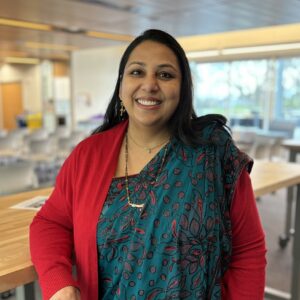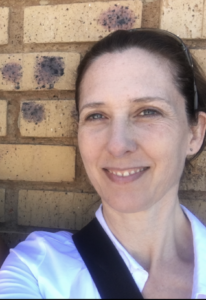Regional Reports
Vancouver Island Region: Puja Gupta

The landscape of Adult Basic Education (ABE) on Vancouver Island is undergoing significant transformations, driven by the evolving needs of students and the strategic adjustments of educational institutions to enhance accessibility, inclusion, and successful learning outcomes. Amidst the backdrop of a post-pandemic world, institutions like North Island College (NIC), Camosun College, and Vancouver Island University (VIU) are at the forefront of innovating ABE offerings, ensuring that learners across the island have the support and resources they need to thrive.
At NIC, a pivotal return to face-to-face instruction marks a significant step forward in delivering fundamental and intermediate level math and English classes. This approach has proven especially beneficial for students requiring accessible learning, who often face barriers with digital platforms. Recognizing the diverse needs of its student body, NIC plans to expand continuous intake offerings to additional locations and is revising its fundamental math curriculum to enhance student success. Additionally, the introduction of an “ABE access navigator position,” though pending funding, signifies NIC’s commitment to improving student access to essential educational services.
Camosun College stands out for its robust ABE programs, housed within the School of Access, which offer comprehensive Math, Science, and English upgrading courses. The college has seen strong enrollment in both online and in-person classes, with a particular success in digital platforms. Camosun has also launched an Education & Career Planning program, aimed at providing articulated, provincial-level education that counts towards the Adult Grad diploma. Camosun is also focusing on Indigenization, informed by TRC Calls to Action and its own Indigenization Plan. It remains tuition-free for ABE programs, with exciting developments including funding for English pathways into Trades and Health.
VIU’s approach to ABE encompasses a blend of cohort-based, continuous intake, and online asynchronous courses, catering to a wide range of learning preferences and needs. Despite facing budgetary constraints, VIU is dedicated to maintaining a rich program offering, including specialized courses in Biology, Chemistry, Physics, and Computer Science. The university emphasizes collaboration with its Aboriginal University Bridging Program and has introduced “Pathways to Post-Secondary Programs” to facilitate students’ transition to in-demand career paths. VIU’s commitment to integrating ABE within the broader institutional framework underscores its dedication to educational excellence and student success.
Across the board, Vancouver Island’s ABE programs are characterized by a collective commitment to innovation, accessibility, and student-centered learning. Each institution’s unique initiatives—ranging from curriculum restructuring at NIC, Camosun’s strategic Indigenization efforts, to VIU’s budget adaptation strategies—reflect a regional dedication to addressing the challenges and opportunities within ABE. The focus on face-to-face instruction, coupled with the expansion of digital and continuous intake options, illustrates the dynamic nature of ABE delivery, ensuring that education remains responsive to the needs of all learners.
As Vancouver Island’s educational institutions navigate these changes, their efforts highlight a concerted regional approach to enhancing ABE.
Cariboo-Interior Report: Christine Miller
 The University and Employment Preparation Department (UEPrep) and Thompson Rivers University continues to play an important role in serving the ABE needs of the community. We continue to offer high-school equivalent courses at our post-secondary institution in the areas of English, mathematics, chemistry, physics, biology, and student success. Most students carry on with their education and move into other programs at TRU or at other institutions around the province.
The University and Employment Preparation Department (UEPrep) and Thompson Rivers University continues to play an important role in serving the ABE needs of the community. We continue to offer high-school equivalent courses at our post-secondary institution in the areas of English, mathematics, chemistry, physics, biology, and student success. Most students carry on with their education and move into other programs at TRU or at other institutions around the province.
TRU will be going through a transition soon. The search for a new president is underway and we welcomed a new Provost just last year. We are hopeful that this will all contribute to positive change in the institution.
Although TRU continues to experience steady growth in overall student enrollment, the UEPrep Department has witnessed a shift in the composition of its student body. Current trends indicate a slight decrease in domestic enrollments but an increase in international students. This will most likely change again based on changes to policies relating to international students. The UEPrep department serves a higher proportion of Indigenous students than the rest of the institution as a whole.
We continue to see success in our Concierge Model for Student Support – as was borrowed from the Selkirk College practise. We now have a part time program advisor just for our area, and some faculty release to support students as they navigate application, registration, Ed Planner BC, course planning and all the parts of getting ready to be in school.
In terms of challenges, the UEPrep Department sees the need for an increased flexibility of course delivery methods. These challenges are difficult to address, however, mainly due to the relationship between TRU proper, and TRU Open Learning which contractually oversees the delivery of online courses. We are also struggling with finding qualified applicants for sessional (short term) teaching positions, as well as securing necessary tenure-track positions to ensure the future of our department.
TRU has been delivering in-community programming in two areas over the last year – T’Kemlups and Lillooet. In-community programming was delivered in response to community needs, includes more comprehensive supports to students and is characterized by smaller class sizes, partnerships, and flexible delivery options.
The Lillooet cohort of students was funded by the Provincial Government through a Pathways to ECE grant. The UEPrep department provided the upgrading necessary to qualify for the ECE program. This was delivered in Fall 2023 and Winter 2024 and included courses in math, English, student success and computing. The ECE courses began in Winter 2024 and students are preparing to take the remainder of their ECE courses. This in-community programming can create dramatic positive change in the lives of individuals and in the communities themselves.
Surrey and Delta Report – Roberta Power
Programming Offered
-

Delta Continuing Education offers a wide range of courses year-round throughout the community.
Programs include adult basic education, a variety of high school completion choices, workplace and
computer training. In addition, the District facilities operate a number of government-funded programs
including LINC and the Life Skills Program. - Delta Continuing Ed is also a provincially-approved training institution for Early Childhood Education
certification.
Likewise, in Surrey, there are opportunities to improve literacy skills, complete a graduation
certificate, course upgrading, or earn a career certificate or diploma at Surrey college. With respect to
the latter, students can choose from these programs: Education Assistant Program ( full-time) and
School Clerk Certificate (part-time).
Enrolment and numbers
- •Enrolment in Foundations, Highschool completion, LINC and Academic Upgrading have increased
significantly by at least 20 percent in Delta and approx. 35 percent in Surrey; there are long waitlists. - Delta Access allows students to do their high-school completion online now as well, so numbers have
decreased for in-person classes. - In Surrey, one of the main ABE providers, Queen Elizabeth Continuing Ed, has seen 1600 students
pass through their door this year. In similar fashion, enrolment has gone up at Invergarry Adult Education Centre.
Online, In person, or Hybrid?
- The majority of classes are in person in Delta with a few hybrid offerings. However, Delta Access now
offers high school completion courses online, and these are now preferred over in-person classes. - The Ministry of Education in Surrey has a requirement to offer in person classes only, meaning their instructional delivery model has to be face-to-face.
Changes
- Students in the LINC program now use a lot of the space and classrooms in Delta Community
College, which have made less room for ABE and Foundations courses. Attendance is better in all
Adult Education Programs overall, however, as stricter attendance rules are being enforced to ensure
active participation as well as accommodate students on wait lists that are eager to get into programs. - As Surrey schools continues to grow, they are looking to diversify their course offerings. They are
starting to offer more courses, both additional selections of current courses as well as new ones.
Queen Elizabeth Continuing Ed will also attempt to establish satellite sites in east Surrey and south
Surrey as some of their students struggle to get to their site in Central Surrey.They have offered their
support to the district to address
Metro Vancouver Report – Stephanie Forgacs
 High-quality, accessible and effective adult education programming is offered at several settings in the City of Vancouver primarily through the Vancouver School Board and Vancouver Community College.
High-quality, accessible and effective adult education programming is offered at several settings in the City of Vancouver primarily through the Vancouver School Board and Vancouver Community College.
Driven by the Provincial government’s commitment to provide students with opportunities to increase literacy, numeracy and academic skills, these sites offer a range of coursework in English, Mathematics, Computer Literacy, Science subjects and basic literacy and numeracy skills through to Grade 12.
The Vancouver School Board offers ABE at three sites. The largest, South Hill Education Centre, has seen the most growth particularly in the demand for in-person classes in English Foundations 1, 2, 3 and 4. The VSB’s Adult Learning Centre in the Gathering Place located in Vancouver’s West End has also seen an increase in the demand for English foundations classes in the past year. The third site, the Canucks Family Education Centre, is located at Britannia Secondary School in the Grandview Woodlands area and offers English classes two days per week.
Vancouver Community College (VCC) has two locations in Vancouver (Broadway and Downtown) and houses several group-based and self-paced programs including ABE Grade 10 -12, pre-Grade 10 courses and an ABE Youth Program for students aged 15-24.
The overall enrollment in ABE courses at VCC in 2023/24 is 1,198 students in the College and Career Access programs (self-paced) and 711 students in College Foundations courses. The enrolment numbers in the College Foundations courses are slightly down from last year.
VCC’s Grade 10-12 program offers courses in English, Biology, Physics, Math, Chemistry, Careers and Computers. Courses are offered in both self-paced and group-based formats. The Pre-Grade 10 program offers English, Math and Computer courses four days per week in both an in-person and online format at the Broadway campus. Two outreach classes are also offered in partnership with the Community Adult Literacy Program Grant – one in the Downtown east side and one at Coast Clubhouse for people in recovery from mental health challenges. VCC’s ABE Youth Program is run off -site at the Broadway Youth Resource Centre. Created for youth aged 15-24, the program offers the entire Grade 10-12 curriculum.
A general trend at VCC is that the majority of Grade 10-12 students prefer to study online. There is also a trend toward self-paced learning.
In the greater Vancouver area, ABE and upgrading courses are also offered at Kwantlen Polytechnic University, Douglas College and Capilano University.
Fraser Valley Report – Barnabe Assogba

After the pandemic, many institutions in the Fraser Valley Region are navigating the optimal mode of lecture delivery. Some are experiencing increasing enrolment numbers while others are noting persistent decline, impacting the availability of qualified courses. Investigations into these trends are ongoing, with practical solutions anticipated soon.
University of the Fraser Valley (UFV): The department in charge of ABE has transitioned to a new faculty, and a process is on the way to being embedded in one of the schools. The enrolment numbers are good, and the current budget is promising. UUP is presently exploring developing and expanding our community-based partnerships with our local Community Adult Literacy Programs (CALP) and Language Instruction for New Canadians (LINC) classes. This will help to create a transition for domestic adults needing literacy, numeracy, and English as an Additional Language support, as well as skills to prepare for their entry to post-secondary courses and programs. In addition, recently, there has been a nascent idea that the department should consider launching outreach events to provide prospective students and their families firsthand experience of the university’s ecosystem. Encourage instructors to showcase mini-lectures on various societal topics and tour attendees of the university’s classrooms and laboratories. ABE is engaging in collaborative efforts with departments such as the Teacher Education Program and partnerships with Seaford Island First Nations. The goal of this is to increase student enrolment at different levels. The ongoing process of indigenizing courses is also a key area of development. While our efforts are directed towards attracting more fundamental and intermediate students, there is a growing demand for both advanced and provincial courses, but there is a lack of qualifying instructors, which poses a significant challenge. UFV is working towards a hybrid learning model. Nevertheless, there is pressure to reintroduce more in-person classes to facilitate collaboration among students, staff and faculty.
Kwantlen Polytechnic University (KPU): ABE-KPU has been experiencing a decline in enrolment for the past few years, which has significantly impacted the availability of math and science upgrading courses compared to pre-COVID-19 levels. A working group has been established to investigate strategies to enhance the development and availability of upgrading courses to assist students effectively. Through a partnership, KPU is currently offering English courses at Tsawwassen First Nation and plans to expand its offerings by adding the delivery of qualified math courses in the near future as part of a broader strategy to diversify the curriculum. Concerns regarding the effectiveness of assessment tools are being addressed at KPU, considering the piloting of Accuplacer as an additional assessment tool. To ensure smooth enrolment processes and improved student retention, decisions are being made to follow up on student enrolment after the assessment.

